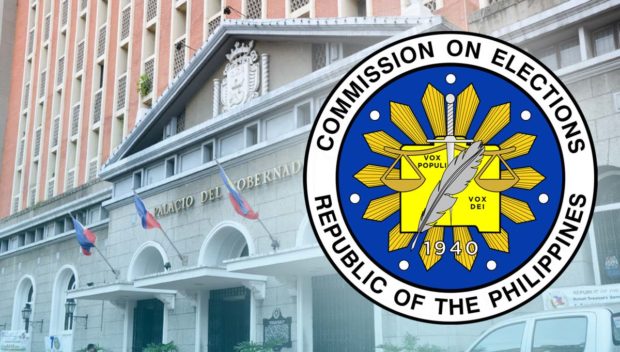
Comelec headquarters in Intramuros, Manila. INQUIRER FILES
MANILA, Philippines — Any national plebiscite will have to be conducted before October 2024 — with a thin window being open for August and September — as the Commission on Elections (Comelec) would be so busy preparing for the 2025 midterm polls.
During the hearing of the House Committee on Suffrage on Tuesday, Kabataan party-list Rep. Raoul Manuel asked Comelec Executive Director Teopisto Elnas Jr. whether any plebiscite could affect Comelec preparations for the 2025 midterm elections.
In response, Elnas said that plebiscites would not be a problem if they were held now, as the Comelec was still in the bidding process for vote counting machines and other election paraphernalia.
“As of now, preparations would not be derailed and the manpower and the focus of the Commission would not be split into two. Because we are still in the bidding process. But in case plebiscites would be held at the tail end of this year — third and last quarter of 2024… I hope we do not have one because by October because we will then start with the filing of certificates of candidacy,” Elnas said in Filipino.
“So much so by January (2025), February, March, and April, the bulk of our preparations would be here. Actually, we would start by August, September, October, and November. We will start on the technical side [of] customization — loading ng machines, mock elections, field test, and other technical preparations that we would do,” he added.
If there is a window should the extreme need for a plebiscite arise, Elnas said that it should be done between August and September.
He also reminded lawmakers that there would be two elections in 2025 — the midterm polls and the Barangay and Sangguniang Kabataan elections (BSKE).
“So our window, Your Honors, per discussion with the chair, up to August or September only — because if held in October, this will affect our many activities — technical and the filing of certificates of candidacy in relation to the 2025 national and local elections,” he explained.
“Because we have two elections next year, national and local elections plus barangay elections. And aside from that right after the national and local elections in May, we are under obligation to conduct registration for new voters with the SK and barangay elections voters which will be done by December. So 2025, conducting a plebiscite is really next to impossible,” he added.
Manuel did not mention what particular plebiscite he was talking about, but the lawmaker and his colleagues at the Makabayan bloc have been critical of the push for a people’s initiative — a signature campaign for registered voters to signify their support for constitutional amendments.
Under the schedule provided by Manuel, proponents of the people’s initiative target somewhere between June and July as the plebiscite date. This was corroborated by majority member and Albay 2nd District Rep. Joey Salceda, who said in a briefing last week that people who initiated the charter change push were aiming at these months.
Salceda added that a lot of the districts in the country — an estimated 80 percent — were in the process of turning over the signature campaigns for their respective local bodies’ validation.
Funding issues too
Eventually, Manuel shifted to the possible cost of a plebiscite, to which Elnas said that it would really affect the Comelec budget since even the 2024 funds reinstated by the bicameral conference committee would be needed for certain projects.
“It would really affect us financially because the additional funding requirements in the budget — actually these are not increments, Y our Honors, Mr. Chair, because these are the items which were removed when we made the proposal with the DBM [Department of Budget and Management],” Elnas said.
“Like for instance that information campaign, funds were removed, also for internet voting, and other items. So if there is a plebiscite by maybe August or September, we would really run short on funds… So definitely, there would be a financial crisis within Comelec just in case any national plebiscite moves through this year,” he added.
Last December, Speaker Ferdinand Martin Romualdez and Senior Deputy Speaker Aurelio Gonzales Jr. floated the possibility of discussing Charter change again, believing there is a need to amend the Constitution’s restrictive economic provisions and let more foreign investments enter.
However, instead of a constituent assembly or a constitutional convention, Gonzales said the House might consider people’s initiative petitions, as the Senate had not acted on the Resolution of Both Houses No. 6 for months.
Eventually, Senate President Juan Miguel Zubiri and other lawmakers filed RBH No. 6, as a response to the agreement between him and Romualdez regarding Charter change.
But Senate Majority Leader Joel Villanueva said many of the senators were no longer interested in RBH No. 6 because the House was supposedly behind the people’s initiative.
Romualdez clarified, however, that the House was not endorsing or sanctioning lawmakers’ participation in the people’s initiative.